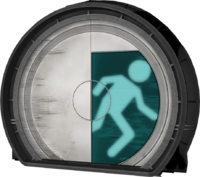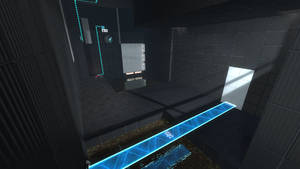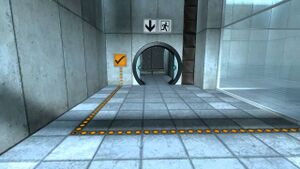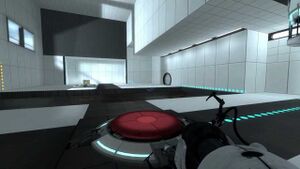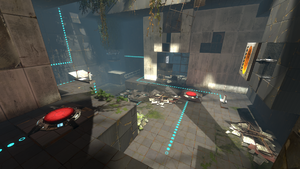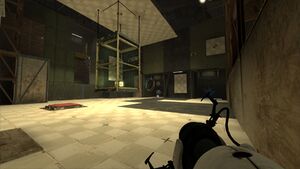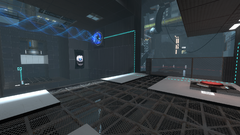Test Chambers: Difference between revisions
(I added) |
No edit summary |
||
| Line 22: | Line 22: | ||
{{Clr}} | {{Clr}} | ||
=== | === Overgrown (Portal 2) === | ||
[[File: | [[File:Portal 2 Chapter 1 Test Chamber 05.png|thumb|right|Decayed, ruined chambers.]] | ||
This type of level design can be seen mostly in | This type of level design can be seen mostly in Chapter 1 of Portal 2, where Clell explores the devastating designs of destroyed chamberss. Outgrown leaves and grass dominate over the ruined panels mostly missing the final touch, just having the metal holder rim visible on the surface. The ruins don't seem a big roadblock to the player, but might impose a sort of emotional feeling to the player {{Spoiler|because the reason why Aperture has gone decayed is the side effect of the player's actions in the first game, and might find themselves guilty, even though they shouldn't be.}} | ||
Chapters that this style appears in:"The Courtesy Call", | Chamber transitions are usually placed in very broken elevator rooms surrounded by plants, often with debris floating through the tubes. Some test chamber doors are broken or malfunctioning. | ||
Chapters/Courses that this style appears in: "The Courtesy Call", and "Hard-Light Surfaces"(Co-op) | |||
{{Clr}} | {{Clr}} | ||
Revision as of 21:17, 5 October 2022
Test Chambers are a vital part of the Portal series and the Aperture Science Enrichment Center. Via the Security Cameras fixed onto the walls of test chambers at various points, GLaDOS can track a test subject's movements and progress.
There are hundreds and more test chambers throughout the Enrichment Center, which can be easily reconfigured and recycled to form another new test chamber. In Portal 2, these chambers can be swiftly created by GLaDOS with the usage of robotic arms carrying panels and combining them with other panels to form a ceiling, floor, and walls.
Aesthetically, these chambers bear resemblance to a hospital with its sterile environment; due to the lighting used within chambers, and the black and white coloring of the walls, floors, and ceilings.
Test Chamber Design/styles
Clinical (Portal)
Every Portal chamber (not including the escape sequences) have a distinct and recognizable look - white, sterile rooms with the atmosphere that conveys the emotions of loneliness. Most of the details seems a little blurry, possibly done on purpose to create a dusty, old atmosphere and immerse the player better into the experience.
"Remastered" clinical (Portal 2)
Sections of Portal 2 chambers looks like the chambers from Portal, but made to fit the theme of the game and more refreshed and modern compared to the looks of Portal. The panels are more reflective, polished and easily recognizable to the average player. Every item design is revamped to suit to the modernistic theme of the game.
Chapters that this style appears in:"The Surprise", "Team Building"(Co-op), "Mass and Velocity"(Co-op), "Excursion Funnels"(Co-op) and the Perpetual Testing Initiative
Overgrown (Portal 2)
This type of level design can be seen mostly in Chapter 1 of Portal 2, where Clell explores the devastating designs of destroyed chamberss. Outgrown leaves and grass dominate over the ruined panels mostly missing the final touch, just having the metal holder rim visible on the surface. The ruins don't seem a big roadblock to the player, but might impose a sort of emotional feeling to the player because the reason why Aperture has gone decayed is the side effect of the player's actions in the first game, and might find themselves guilty, even though they shouldn't be.
Chamber transitions are usually placed in very broken elevator rooms surrounded by plants, often with debris floating through the tubes. Some test chamber doors are broken or malfunctioning.
Chapters/Courses that this style appears in: "The Courtesy Call", and "Hard-Light Surfaces"(Co-op)
50-80's era Aperture (Portal 2)
Through the Portal 2 storyline, the player encounters old looking levels with graphics predating the 90's. They are, so called, the Cave Johnson levels, which have a distinct look no other level design has. Its color use shifts more to the hues of green, yellow, brown etc., which is quite different to the color scheme all of the other Portal levels have - the hues of black and white. The contents of the test chambers' designs are more colorful and noticeable. Almost everything doesn't cut corners, other than the decorative pipes.
Chapters that this style appears in:"The Fall", "The Reunion", "Mobility Gels"(Co-op) and "Art Therapy"(Co-op and only the last test chamber)
Wheatley's Chaotic Chambers (Portal 2)
This is the last type of level design and can be seen in the last two chapters of the single-player, This test chambers are made by Wheatley and it's made clear that he doesn't know how to make test chambers, Different chambers who had nothing to do with the other are mashed, Holes are everywhere in the walls, every few seconds a explosion happens, in the latter test fire can be seen in the background, instead of the normal goo is bottomless pits, full of pipes making it very clear that Wheatley is putting tests where there weren't supposed to be, instead of the normal Weighted Storage Cubes there is the Frankenturrets and Monitors are everywhere to Wheatley talk to Chell and GLaDOS.
Chapters that this style appears in:"The Itch" and "The Part where he kills you"
Challenge modes
In Portal, challenge mode test chambers can be found in the game's "Bonus Maps" menu option. In Portal 2 however, the challenge modes can be played via selecting "Play Challenge Mode" in either single-player or co-op.
The chambers in the challenge mode are identical to the original campaign versions, only with the implementation of goal-based puzzles. These include completing the map with the:
- Least amount of portals deployed
- Least time elapsed
- Least amount of steps taken (Available in Portal only)
In Portal, the stats will be compared to the goal, and if you matched the number of portals / steps / time to the goal (or got less than it), it will get harder and harder. In Portal 2, player stats will be saved into the Steam leaderboards. This allows the Steam community to keep track of friends and other players who have beaten them in either least portals created, or least time taken to complete a test chamber.
Advanced chambers
Available only in Portal, these are variants of the test chambers which have been redesigned with an advanced difficulty curve, for instance by decreasing the number of portalable surfaces, or by increasing the presence of Goo.
Like challenge chambers in Portal, advanced chambers can be played via the "Bonus Maps" section on the main menu.
The Portal 2 Sixense MotionPack DLC contains advanced chambers for Portal 2.
Related achievements
Portal
|
|
Test chamber mechanics
Portal
- Portals - The core mechanic of the game, the "worm holes" used to complete the test chambers. Introduced in the Relaxation Vault.
- Heavy Duty Super-Colliding Super Button - Can be pressed by the player or held with a cube, the button acts like a switch, turning on and off different things (opening doors for instance). Introduced in Test Chamber 00.
- Vital Apparatus Vent - The air vent delivering the cubes into the chambers. Introduced in Test Chamber 00.
- Cubes - A multipurpose object used to press buttons, block unwanted forces, or to stand upon. (Weighted Storage Cube introduced in Test Chamber 00 & Weighted Companion a special cube introduced in Test Chamber 17)
- Material Emancipation Grill - A grid put at the end of test chambers used to stop players from getting objects out of the chamber. It is also used as a test element. Introduced in Test Chamber 00
- Victory Lift - A vertical variant of the Unstationary Scaffold that automatically rises if a player is upon it, and descends if unoccupied. Introduced in Test Chamber 06.
- High Energy Pellet - An energy ball that needs to be put in its receptacle to power other objects. Introduced in Test Chamber 06.
- Unstationary Scaffold - A platform used for transportation along a rail. Introduced in Test Chamber 07.
- Turrets - Military grade turrets used for area denial. They fire bullets at players that enter their field of view. Introduced in Test Chamber 16.
Portal 2
- Aerial Faith Plate - A launcher that throws the player and any objects at a fixed trajectory. Introduced in Chapter 2 Test Chamber 5.
- Thermal Discouragement Beam - A laser beam fired in a straight line. Must be avoided or redirected using a Discouragement Redirection cube. Introduced in Chapter 2 Test Chamber 1.
- Cubes (Edgeless Safety & Discouragement Redirection) - Cubes that can be used to hold down buttons for example (Discouragement Redirection introduced in Chapter 2 Test Chamber 2 and Edgeless Safety introduced in Co-op Course 1 Chamber 2).
- Hard Light Bridge - A semi-translucent, solid 'sheet' of light that can act as a bridge or wall. Introduced in Chapter 3 Test Chamber 11.
- Gels (Propulsion, Repulsion & Conversion) - Can coat surfaces and apply different effects. Repulsion introduced in Chapter 6 Enrichment Sphere 2, Propulsion Chapter 7 Enrichment Sphere 5, Conversion Chapter 7 Enrichment Sphere 6.
- Excursion Funnel - While inside this funnel of energy, objects will be unaffected by gravity and will travel along the path of the funnel. Introduced in Chapter 8 Test Chamber 1.
- Edgeless Safety Cube Receptacle - Place Edgeless Safety Cubes into these receptacles to activate different types of objects. Introduced in Co-op Course 1 Chamber 2.
List of test chambers
Official Games
Portal test chambers
Portal 2 test chambers
Portal: Still Alive test chambers
Mods
Portal Stories: Mel test chambers
| |||||||||||||||||||||||||||||||||||||||||||||||||||||||||||||||||||||||||||||||||||||||
